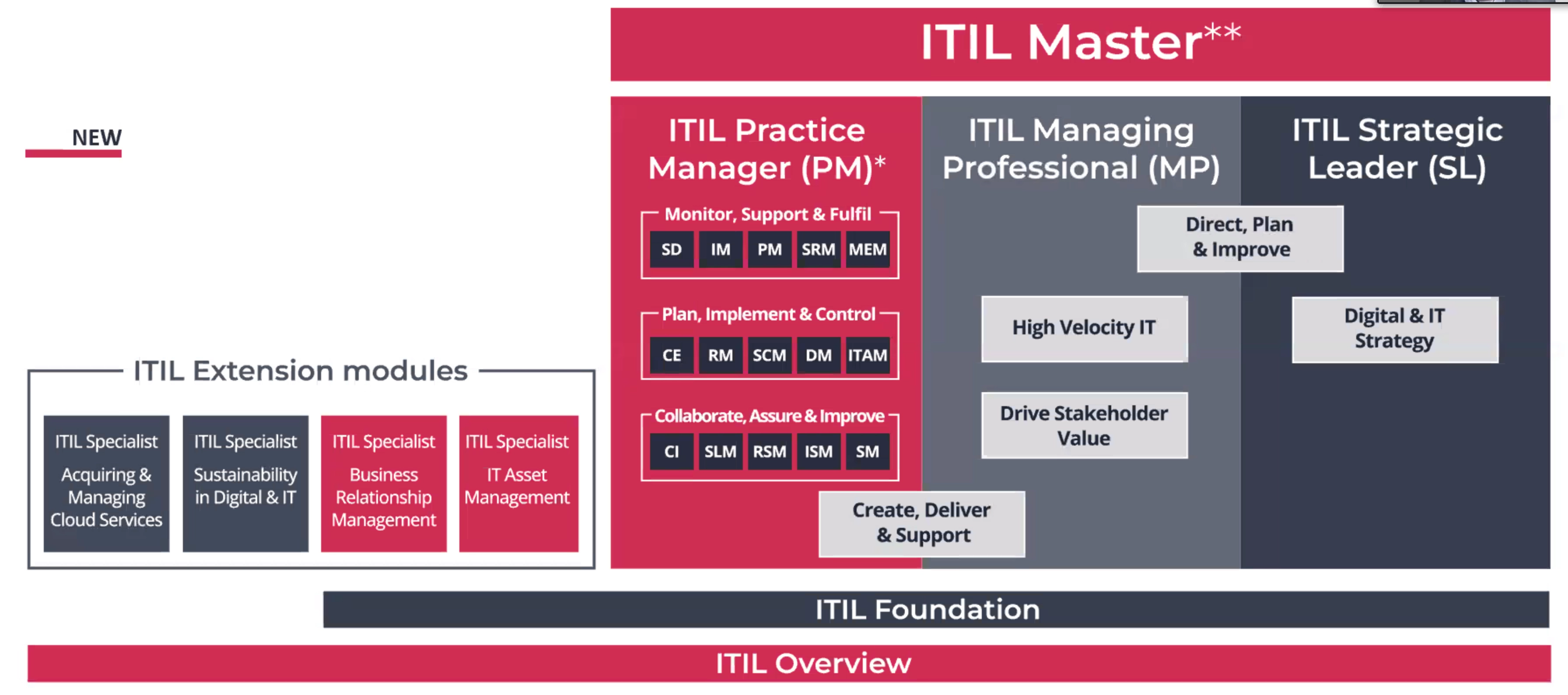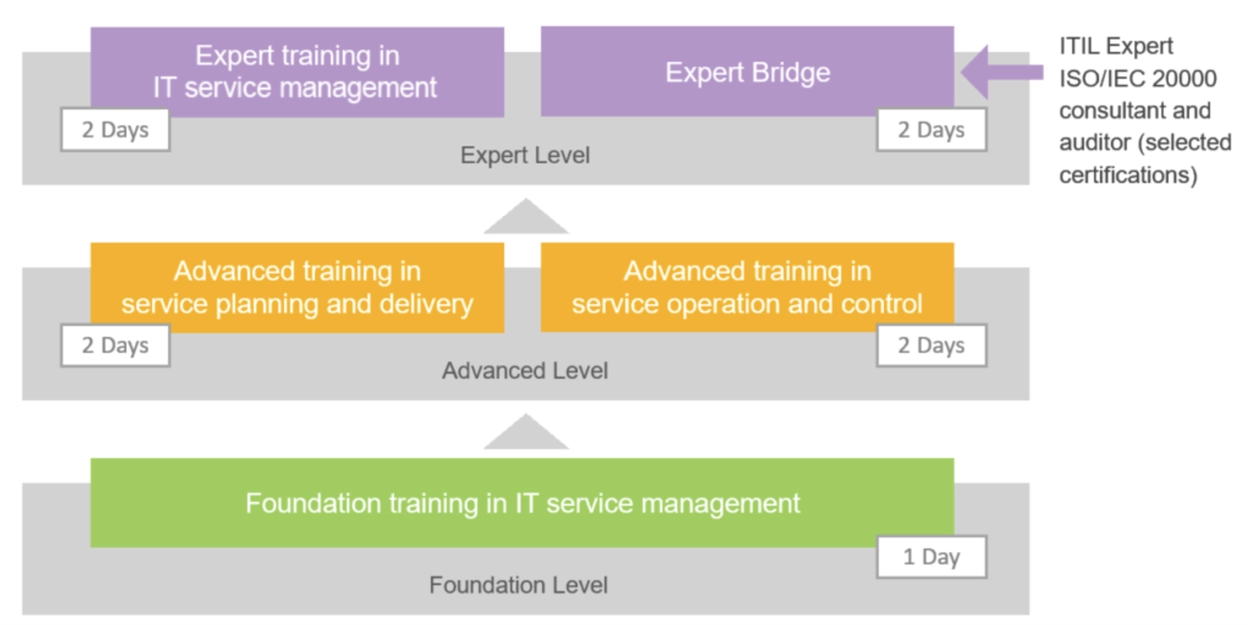IT Service Management: which training?
IT Service Management: all the training and certification available on the market
IT Service Management is a mature discipline that evolved since the ‘70s last century and reached popularity with ITIL® in the first decade of this century all over the world. ITIL® has been the “de facto standard” for IT Service Management for many years. However, ITIL® is not a standard but a best practice accompanied by a competences qualification scheme with millions of certifications worldwide.
IT Service Management and ITIL® in particular have been proved useful for aligning IT services with the needs of a company and improve the quality of IT service management and the delivery of IT services. IT service management can help organizations to:
- Improve the efficiency and effectiveness of IT services
- Increase customer satisfaction by delivering high-quality IT services
- Manage risk and ensure compliance with industry standards and regulations
- Reduce costs and increase value from IT investments
- Continuously improve IT processes and services.
Why is ITIL® challenged?
Until a decade ago, ITIL® had no real competitors but only “complementary” practices and standards.
However, the scenario has changed in the last decade with the raise or growing of alternatives. The reasons behind this change are probably two:
- the increasing complexity of ITIL® certification scheme;
- the cost of ITIL® certification.
The ITIL® qualification scheme (depicted in the figure below that is not including recent announcements of new certification levels) has become more and more complex together with the enlargement of the related body of knowledge. Accordingly the acquisition of basic knowledge has been moved from the Foundation level to the next steps. To really know something of practical use about IT Service Management, it is necessary at least to achieve a qualification above the Foundation level.

ITIL® 4 certification scheme
The cost of ITIL® certifications have dramatically increased in the last three years and are now more than duplicated. But the real cost increment will start from 2023, as the current holder of ITIL® IPR decided to establish a limit of of 3 years in the validity of ITIL® certificates. For more information about this important change, please read also the following article How to renew your ITIL certification. Now, all ITIL® certification (including ITIL® Foundation) will last three year. It will be possible to maintain the validity of the certification with different mechanisms, but each of them will have a cost.
Read more about how to choose an ITIL® certification at this link: Guide to choose the ITIL® 4 advanced courses.
For these reasons many started to wonder: does it make sense to maintain the certification or not?
Are there alternatives to ITIL®?
Not so many and not as famous as ITIL®, so far, but there are. It is also likely that some will enter the market in the next years.
In this article, we will examine the following:
- FitSM®
- ISO/IEC 20000
- VeriSM
- OpenSM
FitSM®
FitSM, first published in 2012, is a free and lightweight standards family aimed at enabling effective IT service management in the broadest range of organisations. FITSM provides guidance and best practices for managing and delivering IT services in a manner that is efficient, effective and aligned with the mission and the objectives of the organization. The framework covers areas such as IT service delivery, IT service support, IT governance, and IT service management operations. The goal of FITSM is to improve the quality of IT service delivery and support in government organizations and to enhance the value of IT to the business.
Largely inspired by ITIL®, FitSM comes with a glossary, objectives and activities (processes), a role model, templates, implementation guides and a maturity and capability assessment scheme.
It also comes with a qualification scheme, training paths and certifications as described in the picture below.

FitSM® qualification scheme.
The qualification scheme is very similar to the one of ITIL® v2.
The key strengths point of FitSM® are
- free, the body of knowledge can be downloaded freely (ITIL® books shall be purchased);
- strongly aligned to ITIL® v2 (this making it early to acquire by ITIL® practitioners);
- complete yet lightweight;
- provided with a set of requirements and aids to guide the implementation of IT Service Management (inspired by those of ISO/IEC 20000).
For more information on FitSM® please read FitSM® (Service Management) certification courses.
ISO/IEC 20000
ISO/IEC 20000 is an international standard for IT service management. It was first published in 2005 and it is based on the ITIL framework (version 2). The standard provides a set of requirements for organizations to deliver managed and professional IT services. As it is for many others ISO standards (e.g. ISO 9001), it is possible for an organization to get certified against the requirements of ISO/IEC 20000. This demonstrates that the organization has a sound Service Management System that is compliant with the requirements of the standards. Practically, this ensures that the organization is striving to achieve its customers’ requirements for service management and continually improve.
ISO/IEC 20000 has many parts but the key ones are:
- ISO/IEC 20000-1 the requirements;
- ISO/IEC 20000-2 the guidance on the application of the SMS.
ISO/IEC 20000 body of knowledge is of course mandatory for all those involved in a ISO/ICE 20000 certification, but it can be also used by practitioners that are simply trying to improve Service Management in their organization.
There are many qualification schemes for ISO/IEC 20000. Typically they include three levels of certifications:
- Foundation
- Practitioner / Implementer
- Auditor / Lead Auditor
The key strengths point of ISO/IEC 20000 are
- a complete set of requirements and guides for the implementation of a Service Management System in many sectors and domains;
- fitting well with the implementation of other ISO related management systems (e.g. ISO/IEC 27001).
For more information and courses on ISO/IEC 20000, please read ISO/IEC 20000 Certification and Training Courses.
VeriSM®
VeriSM™ was first launched in 2017 and it is a service management approach that helps service providers to create a flexible operating model to meet desired business outcomes. VeriSM™ supports organizations to succeed in the world of digital services, using all organizational capabilities, from IT to Marketing and Finance to Customer Service, in order to deliver value.
The main VeriSM™ publication (that is not free) covers the following parts:
- part 1 introduces various concepts around services and service management;
- part 2 presents the VeriSM model and the VeriSM management mesh;
- part 3 provides an overview of progressive management practices and emerging technologies in the domain of service management.
We could summarize that rather than providing specific IT Service Management processes and guidance, VeriSM™ helps with a model to build customized ones.
The VeriSM™ qualification schemes includes three levels of certification:
- Foundation
- Professional
- Leader
The key strengths point of VeriSM™ are:
- a model to build and adapt IT Service Management processes;
- it is “aware” of several best practices (e.g. DevOps) and recent technological trends (e.g. cloud computing) and allows to build on them.
For more information and courses on VeriSM™ please read VeriSM Training and Certification: Online and Classroom courses.
OpenSM
This is the last born of the IT Service Practices. IN.SI. Srl created OpenSM because the existing ITSM frameworks were not fit for purpose for many companies in Europe and other parts of the world who have not yet completed their journey to adopt the most consolidated ITSM practices. Actually, this was in response to the raising costs and complexity of ITIL®. It is therefore a light model that claims to be the only ITSM framework that offers a structure (through its operating model), and sustainable guidance appropriate for the maturity level of most companies in emerging markets, and also in many organizations in Europe and US.
OpenSM® has no publicly available body of knowledge yet but provides free training materials.
The OpenSM qualification schemes includes three levels of certification:
- OpenSM Foundation (currently available)
- OpenSM Service Manager (currently not available yet)
- OpenSM Expert (currently not available yet)
The key strengths point of OpenSM are:
- it is a lightweight model for IT Service Management, it may be useful in organization where ITSM maturity is low.
Which one to choose?
We will provide some guidance for choosing the most suited IT Service Management framework and certifications. Of course, these are only general guidelines that should be specifically re-considered for each situation.
ITIL® remains, so far, the most complete, recognized, and proven body of knowledge. If you are a professional involved in IT Service Management implementation and improvement in complex organizations requiring significant levels of maturity for IT service management or if someone specifically requires an ITIL® certificate or knowledge, it is a must.
In all other cases, FitSM® is a very good alternative, providing free knowledge, guidance for implementation and an affordable certification scheme. It also built on ITIL® so, moving to it later, it is not a problem.
For resources working in organizations that want to design IT Service Management processes in an innovative way, VeriSM™ could be considered. Before, please purchase the book and read what it is about.
There are other raising service management frameworks, such as OpenSM. Please investigate if you did not find what you are looking for in the previous ones.

 Login
Login